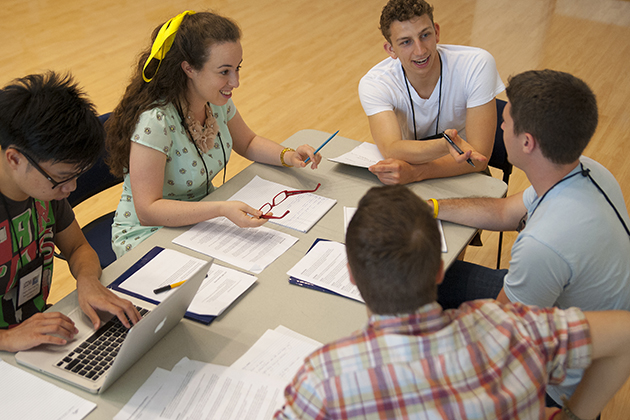
Students from universities in Singapore, Australia, Canada, the United Kingdom, and the United States sat around a table in the ballroom of the Student Union last week in an animated discussion. At various points, heads shook, eyebrows were raised, and hands pointed to the sky.
The students, among 87 from 19 colleges and universities in 12 nations, were working on their group project in the Universitas 21 Summer School held for the first time at UConn. The project: to negotiate an international human rights treaty to be followed by the five fictitious nations represented by the students.
“I love the process, seeing them go through the waves of excitement and frustration, and in the end just being happy that they came up with something,” said David Richards, associate professor of political science and human rights in the College of Liberal Arts and Sciences, who led the treaty project session with Shareen Hertel, director of the graduate certificate in human rights program at UConn. “This is a simulation that’s been run in a lot of places. People come up with a variety of results. They’re going to have to find a way to reach consensus because they have to. That will be the frustration. They’ll have to work through that.”

Representing differing attributes of their fictitious nations that included specific concerns and national policies, it took nearly 90 minutes for the students to agree upon creating a treaty for “The Economic Empowerment of All Peoples.” Periodically, a negotiator at the table would step away to confer with his or her group members. Other times, all negotiators would huddle with their groups and return to discussions. In the end, a treaty with a preamble and six articles addressing workers’ rights, non-discrimination, and monitoring results was among the seven group projects completed by the students and presented the next morning.
Guided by a dozen human rights experts from U21 member institutions brought together by UConn’s Human Rights Institute and the Office of Global Affairs, students participating in the two-week session examined key issues in human rights, visited the United Nations and met with major human rights non-government organizations (NGO) in New York City, and experienced firsthand several human rights agencies and activists in Connecticut, including the American Civil Liberties Union, Migrant Farmworkers Health Clinic and Center for Children’s Advocacy, Connecticut Fair Housing Center, and Greater Hartford Legal Aid.
The program provided a wealth of learning experiences for the students, who traveled from the majority of the higher education institutions holding membership in Universitas 21, a leading global network of research-intensive universities throughout the world.
“The thing that stood out most to me is seeing 80 other very interesting people who care about human rights have different focuses and having one-to-one discussion when we’re having lunch or dinner or walking around,” said Ridhwan Shams, a medical student at the University of Queensland in Australia. “Seeing how the different passions of people play into these discussions and their cultural views where we differ on human rights, not just where we agree, you come out from this experience with a more holistic understanding of human rights – not just your perspective, but from all around the world.”
Visiting agencies in the Hartford region provided a real-world perspective for the students, who in many instances did not previously recognize human rights concerns existing in the United States, a nation generally considered a land of opportunity and wealth. Watching a deportation hearing in a courtroom was a pointed example of the current immigration issues being debated in the U.S.
“I think the students were not aware of the human rights issues we have in the U.S., said Richard Wilson, Gladstein Professor of Human Rights, professor of anthropology and law, and founding director of the Human Rights Institute. “They didn’t expect to see that in a country as wealthy as ours, and the challenges in health care, education, and the immigration issue. They saw three people get deported. They were shocked. I told them this would be a gritty experience.”

Faculty who led the U21 students during the sessions say they were gratified to hear the students express detailed knowledge of issues in their home countries and an intense interest in human rights.
“We learned that there is a real hunger among young people for some pragmatic education in not just what these ideas are about, but what it really looks like to do human rights work on the ground,” said Glenn Mitoma, assistant professor-in-residence at the Human Rights Institute. “We got a tremendous response when they had a chance to interact with human rights practitioners.”
One of the other group projects involved soliciting participants’ personal perspectives on human rights, based on the two-week U21 Summer School experience. The idea was to provide a wide variety of responses on human rights issues and experiences. The responses were anonymous in order to allow students to express themselves who might otherwise be concerned about airing strong opinions at home.
“We wanted to make these submissions anonymous, so people can put in voices that haven’t been heard,” said Sandra Shaker, a student at the University of Maryland working on that group project.
The passionate interest in human rights demonstrated by the students at the U21 sessions provided confidence among the faculty that the issues will continue to be addressed in the future.
“What I’ve been struck by is a very switched-on generation of kids,” said Wilson. “I’m happy to hand the world over to them. I think they are well informed, balanced, measured. They’ve got inquiring minds without being paralyzed with cynicism. I’m impressed. That’s been the discovery for me – this worldwide group of kids of a certain age who are interested in human rights issues.”


